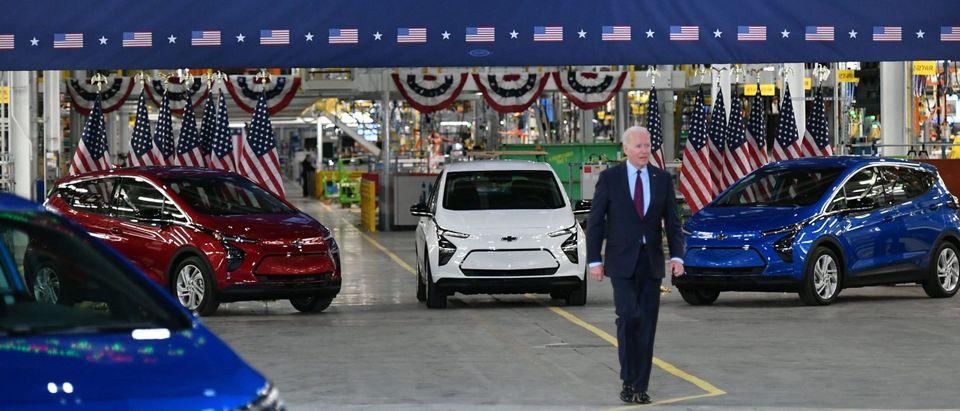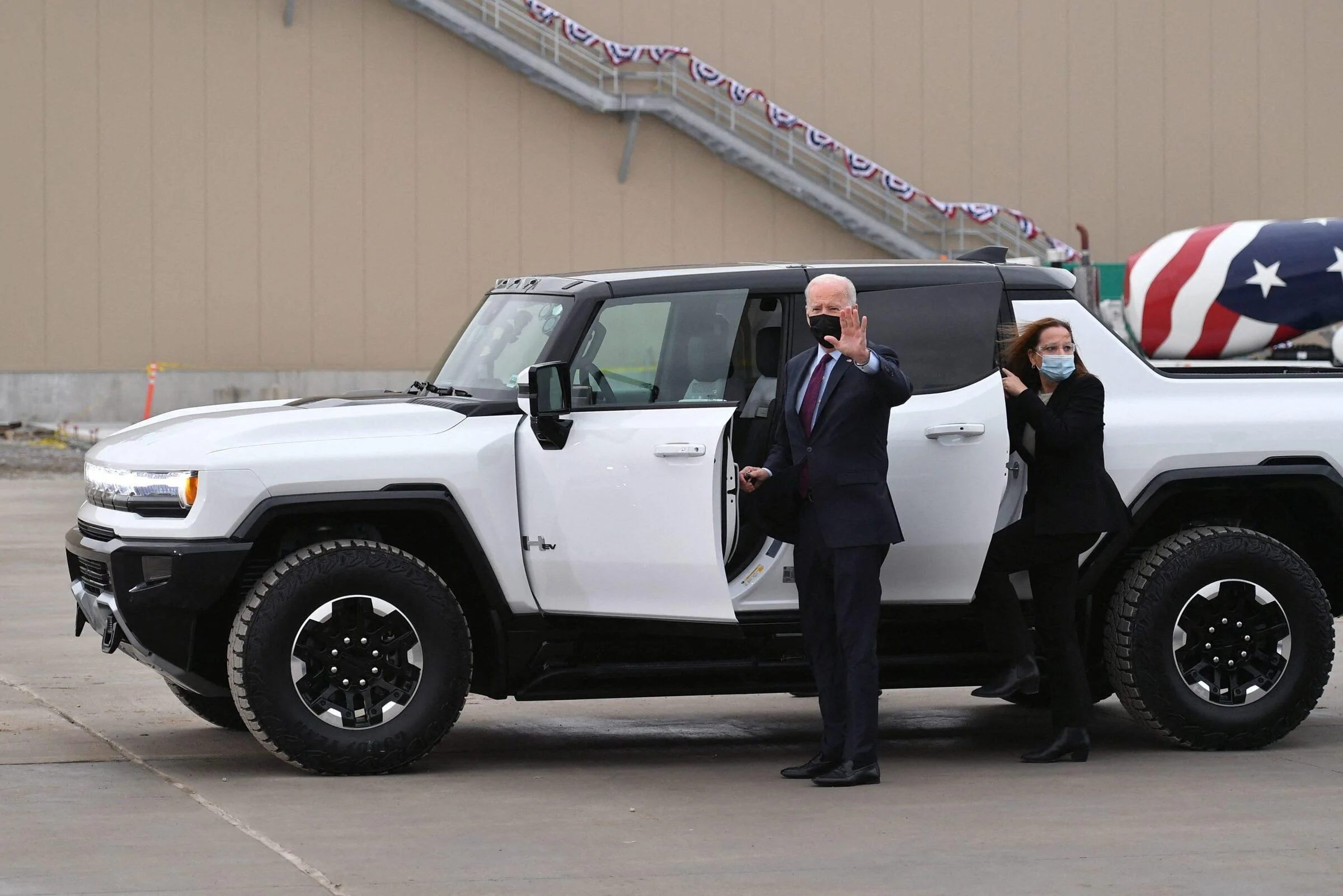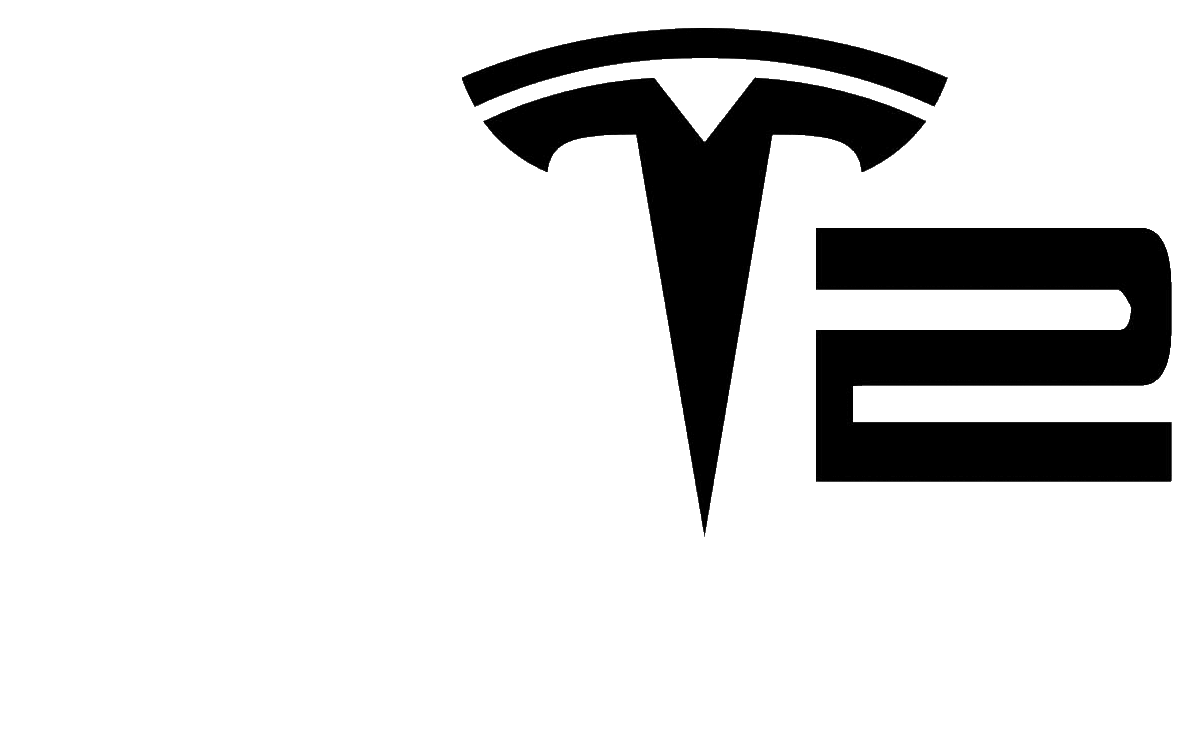FutureBoy
Well-known member
- First Name
- Reginald
- Joined
- Oct 1, 2020
- Threads
- 162
- Messages
- 2,764
- Reaction score
- 734
- Location
- Kirkland WA USA
- Vehicles
- Toyota Sienna
- Occupation
- Financial Advisor
- Thread starter
- #1
Are Electric Vehicles A Scam?

Mandel Ngan/AFP via Getty Images
THOMAS CATENACCI
ENERGY & ENVIRONMENT REPORTER
December 23, 20218:30 PM ET
While EV’s have grown in popularity over the last decade, gas-powered vehicles still account for the vast majority of cars on the road and new car sales, according to Pew Research survey published in June. In addition, a 2020 AAA poll determined that nearly 80% of households with an EV also own a traditional vehicle, suggesting that just a sliver of Americans are making a complete transition.
“One reason to be suspicious of electric cars overall, is that we haven’t solved any of the real problems that we’ve always thought they had,” said Michael Shellenberger, a climate expert who founded the group Environmental Progress.
“Much more should be done, in terms of climate change, to decarbonize the electric production sector, moving from coal to natural gas and uranium,” Shellenberger told the DCNF. “Transportation would not be where I would focus. But obviously there’s a lot of money to be made and a lot of interests that then turn around and fund the members who vote for this.” (RELATED: Elon Musk Says Democrats Should Tank Entire Build Back Better Bill)
The AAA research showed that most consumers are worried about the low availability of fast charging stations nationwide and about the distance an EV can travel before needing a charge. Gregg Brannon, AAA director of automotive engineering and industry relations, said EV adoption is happening at a slow rate and that “range anxiety” is a major reason.
But the U.S. and many other Western governments have made ambitious pledges to transition to EV’s as part of their efforts to combat climate change, even as consumers continue to show reluctance. In the U.S., President Joe Biden has vowed to ensure 50% of private car sales are electric by 2030 and that every addition to the federal governments’ massive vehicle fleet is an EV by 2035.
In 2020, though, EV’s represented just 2% of new vehicle sales in the U.S., according to the International Energy Agency’s annual industry report released in April. That represented a decline in EV share of new sales.
“While they can’t do the job alone, electric vehicles have an indispensable role to play in reaching net-zero emissions worldwide,” IEA Executive Director Fatih Birol said in a statement following the report’s release.

President Joe Biden waves before test driving an electric Hummer in Detroit, Michigan on Nov. 17. (Mandel Ngan/AFP via Getty Images)
‘Subsidy for affluent people’
EV’s have both a shorter range and are often more expensive to fuel than their gas-powered competitors, according to a report from the Anderson Economic Group (AEG) published in October.
“Unlike their reliable gas cars that have 300 or 400 miles of range that can be filled up at a number of gas stations in our country, you have to think about what available chargers you have and plan it out,” Patrick Anderson, the study’s author, previously told the Detroit Free Press. “It’s more than range anxiety, it’s a burden of constantly monitoring the charging status.”
Although the median range for EV’s has increased, it is only about 250 miles per full charge, according to the Department of Energy. Cars powered by gas have a median range of 412 miles by comparison.
Charging an EV is also more expensive than filling up a gas car, costing $12.95 per 100 miles compared to the $8.58 per 100 miles it costs to fuel a comparable vehicle with an internal combustion engine, the AEG report found. The study factored in the cost of electricity, EV registration taxes, cost of home chargers and “deadhead miles” or travel costs for time spent driving to a commercial charging station.
The factors that ultimately make an EV more expensive to fuel than a regular car are factored into the price of gasoline at the pump, the report said. (RELATED: Kamala Harris Thinks The Biggest Obstacle To Buying A $50,000 Electric Car Is Figuring Out How To Charge It)
The typical non-rural EV owner is 20-30 minutes from the closest commercial charging station, which take another 20-30 minutes to fully charge the vehicle, according to AEG. Slower chargers and at-home options may take hours.
“For the infrastructure available as of the mid-2021 in metropolitan areas of the US, we estimate that typical time costs for EV drivers are about five to ten times that of comparable (internal combustion engine) drivers,” the report stated.
The cost of a new EV itself is also much higher than a traditional vehicle. The average dealer price of a new EV is about $51,532 while a new compact car is less than $23,000, according to Kelley Blue Book.
The bipartisan infrastructure bill that Biden signed into law on Nov. 15 included the government’s first-ever investment in a nationwide EV charging infrastructure. The program is also intended to promote EV purchases, the Federal Highway Administration said.
Electric vehicle charging stations are currently found mainly in major cities, according to Pew Research. The availability of commercial charging infrastructure corresponds with where most new EV purchases take place.
However, critics have argued that such a provision would only encourage wealthy people to purchase EV’s. (RELATED: Democrats Strike Offshore Drilling Ban After Manchin Opposition: REPORT)
“The public has an interest in the government setting the standard for how those electric refilling stations ought to be,” Shellenberger told the Daily Caller News Foundation. “But I don’t think it’s in the public’s interest to heavily subsidize EV charging infrastructure. That seems to me like a subsidy for affluent people.”
Tesla CEO Elon Musk echoed Shellenberger’s comments during a recent Wall Street Journal event, arguing in favor of a free market system over subsidies.
“Do we need support for gas stations? We don’t,” Musk told the WSJ. “So, there’s no need for support for a charging network.”
“I’m literally saying get rid of all subsidies,” he continued.

Mandel Ngan/AFP via Getty Images
THOMAS CATENACCI
ENERGY & ENVIRONMENT REPORTER
December 23, 20218:30 PM ET
- Electric vehicles (EV) continue to represent a greater share of new car purchases, but their cost, range and charge rate may hinder many consumers from making the transition.
- “One reason to be suspicious of electric cars overall, is that we haven’t solved any of the real problems that we’ve always thought they had,” said Michael Shellenberger, a climate expert who founded the group Environmental Progress.
- A 2020 AAA poll determined that nearly 80% of households with an EV also own a traditional vehicle, suggesting that just a sliver of Americans are making a complete transition.
While EV’s have grown in popularity over the last decade, gas-powered vehicles still account for the vast majority of cars on the road and new car sales, according to Pew Research survey published in June. In addition, a 2020 AAA poll determined that nearly 80% of households with an EV also own a traditional vehicle, suggesting that just a sliver of Americans are making a complete transition.
“One reason to be suspicious of electric cars overall, is that we haven’t solved any of the real problems that we’ve always thought they had,” said Michael Shellenberger, a climate expert who founded the group Environmental Progress.
“Much more should be done, in terms of climate change, to decarbonize the electric production sector, moving from coal to natural gas and uranium,” Shellenberger told the DCNF. “Transportation would not be where I would focus. But obviously there’s a lot of money to be made and a lot of interests that then turn around and fund the members who vote for this.” (RELATED: Elon Musk Says Democrats Should Tank Entire Build Back Better Bill)
The AAA research showed that most consumers are worried about the low availability of fast charging stations nationwide and about the distance an EV can travel before needing a charge. Gregg Brannon, AAA director of automotive engineering and industry relations, said EV adoption is happening at a slow rate and that “range anxiety” is a major reason.
But the U.S. and many other Western governments have made ambitious pledges to transition to EV’s as part of their efforts to combat climate change, even as consumers continue to show reluctance. In the U.S., President Joe Biden has vowed to ensure 50% of private car sales are electric by 2030 and that every addition to the federal governments’ massive vehicle fleet is an EV by 2035.
In 2020, though, EV’s represented just 2% of new vehicle sales in the U.S., according to the International Energy Agency’s annual industry report released in April. That represented a decline in EV share of new sales.
“While they can’t do the job alone, electric vehicles have an indispensable role to play in reaching net-zero emissions worldwide,” IEA Executive Director Fatih Birol said in a statement following the report’s release.

President Joe Biden waves before test driving an electric Hummer in Detroit, Michigan on Nov. 17. (Mandel Ngan/AFP via Getty Images)
‘Subsidy for affluent people’
EV’s have both a shorter range and are often more expensive to fuel than their gas-powered competitors, according to a report from the Anderson Economic Group (AEG) published in October.
“Unlike their reliable gas cars that have 300 or 400 miles of range that can be filled up at a number of gas stations in our country, you have to think about what available chargers you have and plan it out,” Patrick Anderson, the study’s author, previously told the Detroit Free Press. “It’s more than range anxiety, it’s a burden of constantly monitoring the charging status.”
Although the median range for EV’s has increased, it is only about 250 miles per full charge, according to the Department of Energy. Cars powered by gas have a median range of 412 miles by comparison.
Charging an EV is also more expensive than filling up a gas car, costing $12.95 per 100 miles compared to the $8.58 per 100 miles it costs to fuel a comparable vehicle with an internal combustion engine, the AEG report found. The study factored in the cost of electricity, EV registration taxes, cost of home chargers and “deadhead miles” or travel costs for time spent driving to a commercial charging station.
The factors that ultimately make an EV more expensive to fuel than a regular car are factored into the price of gasoline at the pump, the report said. (RELATED: Kamala Harris Thinks The Biggest Obstacle To Buying A $50,000 Electric Car Is Figuring Out How To Charge It)
The typical non-rural EV owner is 20-30 minutes from the closest commercial charging station, which take another 20-30 minutes to fully charge the vehicle, according to AEG. Slower chargers and at-home options may take hours.
“For the infrastructure available as of the mid-2021 in metropolitan areas of the US, we estimate that typical time costs for EV drivers are about five to ten times that of comparable (internal combustion engine) drivers,” the report stated.
The cost of a new EV itself is also much higher than a traditional vehicle. The average dealer price of a new EV is about $51,532 while a new compact car is less than $23,000, according to Kelley Blue Book.
The Build Back Better Act included a number of handouts that Democratic lawmakers hoped would incentivize more Americans to make the transition away from gas-powered cars. However, the more than $2 trillion bill was effectively killed Sunday when West Virginia Sen. Joe Manchin announced he wouldn’t vote for it.Buckle up! We’re kickstarting an American EV futurepic.twitter.com/OvtfbOjyBL
— Secretary Pete Buttigieg (@SecretaryPete) December 14, 2021
The bipartisan infrastructure bill that Biden signed into law on Nov. 15 included the government’s first-ever investment in a nationwide EV charging infrastructure. The program is also intended to promote EV purchases, the Federal Highway Administration said.
Electric vehicle charging stations are currently found mainly in major cities, according to Pew Research. The availability of commercial charging infrastructure corresponds with where most new EV purchases take place.
However, critics have argued that such a provision would only encourage wealthy people to purchase EV’s. (RELATED: Democrats Strike Offshore Drilling Ban After Manchin Opposition: REPORT)
“The public has an interest in the government setting the standard for how those electric refilling stations ought to be,” Shellenberger told the Daily Caller News Foundation. “But I don’t think it’s in the public’s interest to heavily subsidize EV charging infrastructure. That seems to me like a subsidy for affluent people.”
Tesla CEO Elon Musk echoed Shellenberger’s comments during a recent Wall Street Journal event, arguing in favor of a free market system over subsidies.
“Do we need support for gas stations? We don’t,” Musk told the WSJ. “So, there’s no need for support for a charging network.”
“I’m literally saying get rid of all subsidies,” he continued.
